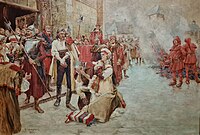Matija Gubec
Matija Gubec (German also Matthias Gubec , Hungarian Gubecz Máté , called Gubec-Beg , actually Ambroz Gubec ; * 1538 in Hižakovac ( Vrhovac ), today to Ozalj ; † February 15, 1573 in Zagreb ) was the leader of the Croatian - Slovenian peasant uprising ( also Windischer peasant uprising of 1573 ), the most important socio-historical event of the Hrvatsko Zagorje .
Gubec is revered as a national hero in Croatia .
First clues
His first mentions by name can be found in the church register of Stubica from the years 1556 and 1560, as well as in the land register of Stubica from 1567.
According to tradition, the name "Matija" was mentioned for the first time about thirty years after the peasant uprising and the death of Matija Gubec. This was done by the Hungarian historian Miklós Istvanffy, presumably based on the Croatian-Hungarian King Matthias Corvinus , the "good King Matthias", who ruled from 1458 to 1490.
Peasant uprising
Matija Gubec led from 1572 to 1573 the peasant uprising ( Croatian Seljačka buna ) in Stubica (Croatia) against the then ruling landlords and counts. The reason for the uprising was a new law that severely restricted the freedom of movement of the peasants and prohibited free wandering. The servants and peasants did not want to suffer the oppression and exploitation by Franjo Tahi , the lord of Susedgrad .
Young boys, farmers, farmhands and people well-disposed towards the people rode through the villages of Croatian “Zagorje” (Zagorje literally means “behind the mountains”, which means the “ Medvednica ” mountain range in front of Zagreb , a hilly, green region to the north from Zagreb) and wore a "cock feather" in their hats as a sign of the uprising. Within a very short time a peasant army was formed, which alarmed the ruling authorities. Therefore Ban Juraj Drašković sent an army to suppress this peasant uprising. In 1572 an open and armed uprising of the Susedgrad farmers broke out against the landlords and counts of the time, in which the king at the time did not know how to mediate, although he had granted the farmers his protection. The unrest also spread to the Styrian (today: Styria / Austria ) and Krainer (today: Slovenia ) farmers and the power of the regional landlords seemed in serious danger . In 1572 the Zagreb parliament passed a declaration in which Matija Gubec and the rebellious peasants were accused of high treason . In the reports of that time, Ambroz Gubec, called Matija Gubec-Beg from the Krapina region ( Hrvatska - Croatia), was already mentioned as the leader of the rebel farmers.
After the peasants were asked in a speech by Matija Gubec-Beg to fight honorably like men or perish (da se ponesu kao muževi, slavno pobijediti ili propasti), the peasant army led by Ilija Gregorić triumphed at Donja Stubica against those commanded by Gašpar Alapić loyal troops within a few hours.
The simply armed peasant troops were, however, wiped out at Gurkfeld in the Lower Carniola (today: Slovenia ) by a second mercenary army of Haramija , originally founded to fight the Ottomans , and then defeated at Kerestinec by the loyal army of Juraj Drašković. It is said that more than 6,000 peasants were killed in action, but the majority were tortured and murdered by the henchmen of the Zagreb Ban Juraj Drašković after the uprising was put down. In this defeat, Matija Gubec also got into the hands of his opponents alive.
death
On February 15, 1573, Matija Gubec-Beg was cruelly executed in public on the square of St. Marko ( Markov Trg ) in Zagreb under torture with red-hot pincers and by putting on a red-hot crown, and then quartered . Since that time he has been revered as a national hero and peasant king, as he had given his life unselfishly for the rights and freedom of the Croatian peasants.
Legend
After Matije Gubec-Beg's death, people in Hrvatsko Zagorje continued to talk for a long time about the fact that he had not died at all and that two mountains lean over him and his army to protect him. So Matija Gubec is now sitting with all his men inside the mountain at a stone table, where plenty of wine is being served for everyone. There the hero's beard slowly winds around this table, until finally after the ninth circumnavigation the mountain will open up and Matija Gubec will then rise again at the head of his army.
reception
The rock opera Gubec-beg by Ivica Krajač and Karlo Metikoš , premiered in 1975, is about Matija Gubec.
literature
- Manfred Stoy: Gubec, Matija in: Biographisches Lexikon zur Geschichte Südosteuropas . Vol. 2. Munich 1976, p. 100 f.
Web links
- Seljacka buna 1573 in the Internet Movie Database (English) (film adaptation, also under the title Anno Domini 1573 )
- Winfried Schulze (Berlin): The Windische Peasant Uprising of 1573 (PDF; 5.5 MB)
- Anniversary of the peasant uprising of Matija Gubec in Gornja Stubica
- More than 400 years old linden tree from Matija Gubec
Individual evidence
- ^ Srećko Matko Džaja : Hrvatsko Zagorje . In: Edgar Hösch, Karl Nehring, Holm Sundhaussen (Hrsg.): Lexicon for the history of Southeast Europe . Böhlau, Vienna 2004, p. 757 ( limited preview in Google Book search).
| personal data | |
|---|---|
| SURNAME | Gubec, Matija |
| ALTERNATIVE NAMES | Gubec-Beg; Gubec, Ambroz (real name); Gubecz, Máté (Hungarian) |
| BRIEF DESCRIPTION | Leader of a peasant uprising "Seljačka buna" |
| DATE OF BIRTH | 1538 |
| PLACE OF BIRTH | Hižakovac (Vrhovac), Croatia |
| DATE OF DEATH | February 15, 1573 |
| Place of death | Zagreb |


